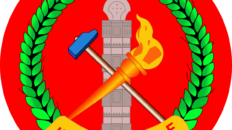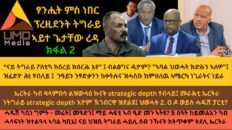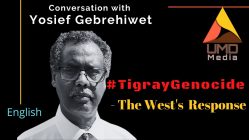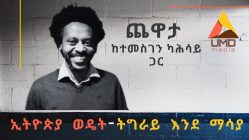UMD Media, February 14, 2025
The first emergency meeting of the Advisory Council of the Tigray Interim Regional Administration (TIRA) is currently underway. The council, established on February 2, 2025, faced months of delays, primarily due to opposition from the TPLF faction led by Debretsion Gebremichael. Originally set to replace the disbanded Tigray Regional State Council, the council was created as per the Pretoria Agreement signed in November 2022 between the Ethiopian government and the Tigray People’s Liberation Front (TPLF).
Delays and Political Disputes
TIRA President Getachew Reda signed a 25-page regulation on April 2, 2024, comprising 26 articles that mandated the council to convene quarterly. Article 9.1 stipulated the AC’s accountability to the law, the conscience, the people, and the head of TIRA. However, it took 306 days to formally establish the council.
UMD Media had previously questioned Tsadkan Gebretensae, Vice President of TIRA and head of democratization and decentralized administration, regarding the delays. He attributed the postponement to a letter written by Fetelework Gebreegziabher, head of the TPLF Secretariat, which instructed local TPLF offices not to send representatives to the council. Following this, President Getachew Reda and Vice President Taddesse Worede engaged in negotiations with TPLF leaders to no avail. As of now, the faction led by Debretsion Gebremichael and Fetelework Gebreegziabher remains absent from the council.
Composition of the Advisory Council
Article 7 of the regulation outlines the council’s original composition:
- 38 members representing electoral districts.
- 9 members from civil society organizations.
- 40 members from political parties, including 10 from TPLF and 6 each from Baytona Greater Tigray, Salsay Weyane Tigray, Tigray Independence Party, and Arena for Democracy and Sovereignty Party, as well as 3 each from Assimba Democratic Party and Axumay Waela.
- 6 members from Tigray’s security forces.
- 2 members representing the Irob and Kunama communities.
- 3 members from Tigrayans residing in Addis Ababa.
- 3 members from the Tigrayan diaspora.
According to Article 9.2, the Supreme Court, Auditor, Media Agency, and the Endowment Fund for the Rehabilitation of Tigray (EFFORT) will report to the council. Article 9.3 mandates that the council chair report to the head of TIRA, while Article 9.4 requires that secretariats, joint committees, and council committees report to the council Chair.
The council will operate through six specialized five-member committees covering Economic Development, Infrastructure and Rehabilitation, Social Development, Resource Administration and Audit, Peace and Security, and Youth and Women Affairs. Its duration will align with that of TIRA, which remains unspecified.
Emergency Meeting and Key Decisions
The emergency meeting, taking place from February 14–16, 2025, is focused on amending Article No. 10/2016, approving draft guidelines and ethics for council members, and reviewing six-month plans from responsible institutions, including EFFORT, the Supreme Court, the Auditor General, and Tigray Mass Media. Additionally, the meeting will finalize appointments for standing committee leadership.
The session is chaired by Dejen Mezgebe, leader of the opposition Tigray Independence Party and the current Deputy Chair of the council. An amendment has been made to Article No. 10/2016 of the council’s term of reference, stating that the council is now accountable to “Conscience, Law, and the People” rather than the President of TIRA.
Other approved amendments include:
- Increasing the council’s membership from 105 to 152 to ensure broader representation.
- Establishing permanent standing committees.
- Renaming the council from Advisory Council to Interim Council.
For many, the emergency meeting marks a step forward in the governance of Tigray, though questions remain regarding the council’s effectiveness and the participation of all political factions. Another opposition party Salsay Weyane Tigray, have raised concerns over its legitimacy and effectiveness. It argues that the council lacks democratic legitimacy and could serve as a tool for consolidating power rather than addressing the needs of Tigray’s population. The coming months will determine how well the council functions in shaping the region’s political and administrative future.





